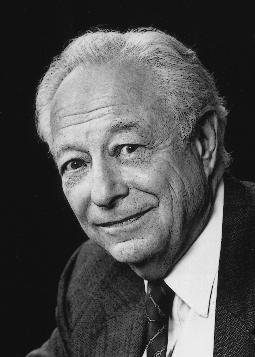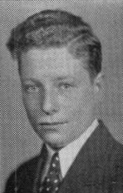Irving Kristol facts for kids
Quick facts for kids
Irving Kristol
|
|
|---|---|
 |
|
| Born | January 22, 1920 New York City, New York, U.S.
|
| Died | September 18, 2009 (aged 89) Falls Church, Virginia, U.S.
|
| Education | City College of New York (BA) |
| Occupation | Journalist |
| Spouse(s) | Gertrude Himmelfarb |
| Children | 2, including Bill Kristol |
Irving Kristol (January 22, 1920 – September 18, 2009) was an American journalist and writer. He is often called the "godfather of neoconservatism". This means he was a very important thinker behind a certain way of looking at politics.
Kristol helped start and edit many magazines. He also wrote for them. This made him a very influential person in American ideas and politics during the second half of the 1900s. After he passed away, some people said he was one of the most important public thinkers of his time.
Contents
Early Life and Education
Kristol was born in Brooklyn, New York. His parents were Jewish immigrants from Eastern Europe. They were not very religious.
He finished high school in Brooklyn in 1936. Then, he went to the City College of New York. He earned his degree in history in 1940. While in college, he was part of a socialist group. He was also part of a small group of anti-Soviet thinkers. They were later known as the New York Intellectuals. Kristol met historian Gertrude Himmelfarb at these meetings. They got married in 1942. They had two children, Elizabeth Nelson and Bill Kristol.
During World War II, Kristol served in Europe. He was a soldier in the 12th Armored Division.
Kristol's Career
Irving Kristol worked with the Congress for Cultural Freedom. He wrote for Commentary magazine from 1947 to 1952. He also helped start and wrote for the British magazine Encounter from 1953 to 1958. Later, he was an editor for The Reporter from 1959 to 1960.
From 1961 to 1969, he was a leader at the publishing company Basic Books. He also taught at New York University from 1969 to 1987. Kristol helped start and edit The Public Interest magazine from 1965 to 2002. He also started and published The National Interest from 1985 to 2002.
In the late 1960s, Kristol joined the American Enterprise Institute. This is a think tank that studies public policy. He was a fellow there for many years. He also wrote a monthly column for The Wall Street Journal from 1972 to 1997. He served on a council for the National Endowment for the Humanities.
In 1978, Kristol and William E. Simon started The Institute For Education Affairs. This group later merged with another to become the Madison Center for Educational Affairs.
Later Life and Death
Kristol passed away on September 18, 2009. He was 89 years old. He died from problems related to lung cancer in Falls Church, Virginia.
Kristol's Ideas
Kristol was a key figure in neoconservatism. This was a new way of thinking that grew in the 1960s and 1970s. Neoconservatives were worried about the Cold War. They also felt that some liberal ideas were becoming too extreme.
Many neoconservatives, including Kristol, wanted the U.S. to be strong against communism. They believed the U.S. should speak out against the Soviet Union's human rights problems. This thinking later influenced policies like détente.
In 1973, the term "neo-conservatism" was first used. It described liberal thinkers who were unhappy with the Democratic Party. They were moving towards a new kind of conservatism. Kristol liked this term for the ideas in his magazine, The Public Interest.
Unlike some liberals, neoconservatives did not support all the "Great Society" programs. These programs were started by President Lyndon B. Johnson. But unlike traditional conservatives, they did support a smaller welfare state. This was like the one started by President Franklin D. Roosevelt.
In 1979, Kristol was on the cover of Esquire magazine. The caption called him "the godfather of the most powerful new political force in America – Neo-conservatism." Kristol himself wrote an article called "Confessions of a True, Self-Confessed – Perhaps the Only – 'Neo-conservative'."
Kristol said that neoconservatism is not a strict set of rules. Instead, it is a "persuasion," or a way of thinking about politics. He said it is practical and not about perfect, impossible ideas. One of his famous sayings was that a neoconservative is "a liberal who has been mugged by reality." This means someone who changed their views after seeing how things really work.
Kristol believed that a strong economy is important for a modern democracy. He also said that economic ideas must include "political philosophy, moral philosophy, and even religious thought." These things are also very important for a healthy democracy.
In his book, Two Cheers for Capitalism, Kristol said that capitalism deserves "two cheers." One cheer is because it works and makes people's lives better. The second cheer is because it allows for a lot of personal freedom. He thought these were big achievements. However, he also felt capitalism puts a "psychic burden" on people. It does not always meet people's deeper needs. This can create a feeling of unhappiness. This is why he gave it only two cheers, not three.
Awards and Honors
In July 2002, Kristol received the Presidential Medal of Freedom. This is the highest award a civilian can get in the United States. It was given to him by President George W. Bush.
Books
Authored
- On the Democratic Idea in America. New York: Harper, 1972. ISBN: 0060124679
- Two Cheers for Capitalism. 1978. ISBN: 0465088031
- Reflections of a Neo-conservative: Looking Back, Looking Ahead. 1983. ISBN: 0465068723
- Neo-conservatism: The Autobiography of an Idea. 1995. ISBN: 0028740211
- The Neo-conservative Persuasion: Selected Essays, 1942–2009. New York: Basic Books, 2011. ISBN: 0465022235
- On Jews and Judaism. Barnes & Noble, 2014.
Edited
- The Crisis in Economic Theory. Edited with Daniel Bell. New York: Basic Books, 1981.
Contributed
- ”Rationalism in Economics” (Chapter 12). The Crisis in Economic Theory. Edited with Daniel Bell. New York: Basic Books, 1981. p. 201.
See also
 In Spanish: Irving Kristol para niños
In Spanish: Irving Kristol para niños
- Gertrude Himmelfarb
- William Kristol
- Norman Podhoretz
 | Sharif Bey |
 | Hale Woodruff |
 | Richmond Barthé |
 | Purvis Young |


